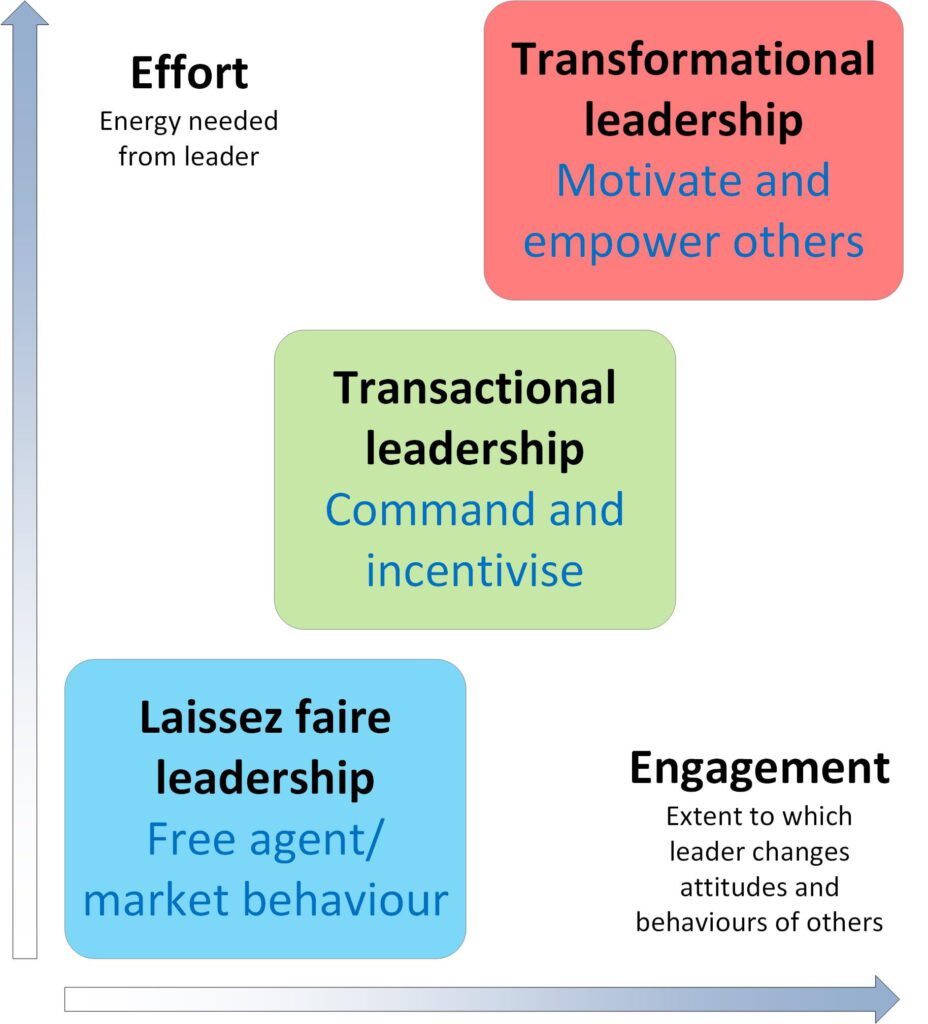Transformational leadership is a leadership style that inspires and drives positive change in individuals and organizations. It is characterized by certain key characteristics and styles.
Here is a detailed explanation of each point:
What is transformational leadership?
Transformational leadership is a style of managing that inspires people and drives positive change in innovative and profound ways.
It is a leadership approach where leaders and followers move each other towards a higher level of morality and motivation.

Transformational leaders create a vision for their followers and guide the change through inspiration and motivation. They are excellent role models and inspire their followers to go beyond expectations.
Definitions of Transformational Leadership
“Transformational leadership occurs when one person engages with others in such a way that their motivation and morality, their goals and values, are elevated and enlarged.”
James MacGregor Burns (1978)
“Transformational leadership is a process of influencing major changes in the values, attitudes, and goals of followers through a variety of mechanisms, including charisma, inspiration, intellectual stimulation, and individualized consideration.”
Bernard M. Bass (1985)
Neale Schriesheim et al. (1995): “Transformational leadership is a process of social influence that raises the level of awareness of followers and moves them to higher levels of motivation and morality.”
Ronald E. Riggio (2008): “Transformational leadership is a process of influencing others to share a common vision and to achieve extraordinary outcomes.”
Kenneth J. Parry and Pamela L. Sinha (2005): “Transformational leadership is a process of influencing followers to transcend their own self-interests for the sake of the group or organization.”
Barbara Kellerman (2016): “Transformational leadership is a process of inspiring and enabling others to achieve more than they thought possible.”
Frederick C. Lowe (2008): “Transformational leadership is a process of influencing others to pursue higher-level goals and to develop their full potential.”
Characteristics of transformational leaders:
Transformational leaders possess certain characteristics that make them well-suited for leading companies towards reinvention and reimagining the future.
Some of the characteristics of transformational leaders include charisma, idealized influence, inspirational motivation, intellectual stimulation, and individualized consideration.
Transformational leaders serve as positive role models, inspire confidence and motivation, encourage creativity and critical thinking, and show genuine concern for the progress and development of their followers.
Transformational leadership styles:
Transformational leadership is comprised of four main components:
- idealized influence,
- inspirational motivation,
- intellectual stimulation,
- individualized consideration.
Idealized influence refers to leaders who serve as role models and demonstrate established organizational values.
Inspirational motivation involves leaders who passionately communicate an exciting vision of the future and encourage commitment to the organization’s goals.
Intellectual stimulation focuses on leaders who encourage innovation and creativity by challenging the normal beliefs and views of a group.
Individualized consideration describes leaders who act as coaches and advisors, showing genuine concern for the progress and development of each individual in the group.
Examples of transformational leaders:
Transformational leadership has been exemplified by various influential leaders throughout history.
Some examples of transformational leaders include Steve Jobs, Oprah Winfrey, Mahatma Gandhi, and Martin Luther King Jr.
These leaders have inspired and motivated others to bring about positive change and have left a lasting impact on society.
My Perspective
In conclusion, transformational leadership is a powerful leadership style that inspires and drives positive change. It is characterized by certain key characteristics and styles, including idealized influence, inspirational motivation, intellectual stimulation, and individualized consideration.
Transformational leaders serve as role models, inspire confidence and motivation, encourage creativity, and show genuine concern for the progress and development of their followers.
Examples of transformational leaders include Steve Jobs, Oprah Winfrey, Mahatma Gandhi, and Martin Luther King Jr.
Was this helpful?
0 / 0